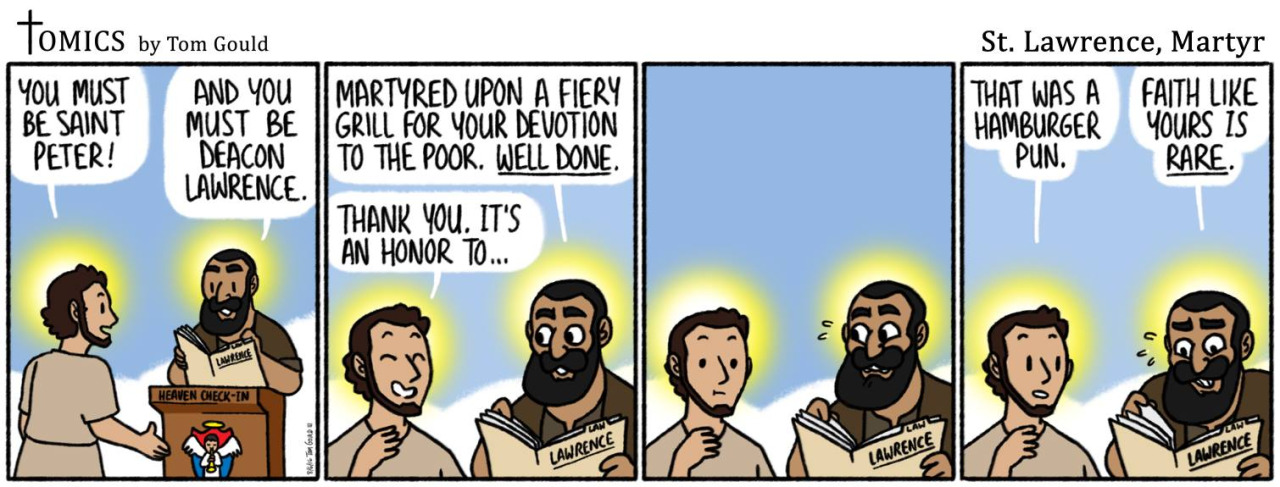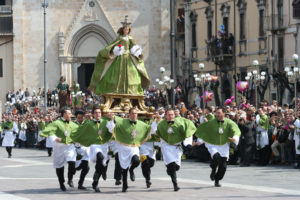Living by faith includes the call to something greater than cowardly self-preservation.
—Kurt D. Bruner, Kurt Bruner, Jim Ware, Finding God in the Lord of the RingsYet I loathe the thought of annihilating myself quite as much now as I ever did. I think with sadness of all the books I’ve read, all the places I’ve seen, all the knowledge I’ve amassed and that will be no more. All the music, all the paintings, all the culture, so many places: and suddenly nothing….If it had at least enriched the earth; if it had given birth to…what? A hill? A rocket? But no. Nothing will have taken place.
—Simone de Beauvoir
Over dinner, I related the stories of the martyrdoms of St. Lawrence of Rome and St. Thomas More to my atheist friend, to which he curtly responded, “They joked when they were just about to die? I don’t buy that.”
“Thomas More had a trial—everything he said was recorded in court documents,” I countered.
These two saints are famous for their pre-mortem quips. St. Lawrence, patron of deacons, cooks, and comedians, exhibited true courage under fire: as he was being grilled to death, he cried out, “Assum est. Versa et manduca.”1 (“It is roasted. Turn me over and take a bite.”)
Thomas More, though not physically tortured, surely underwent intense emotional turmoil in the Tower of London, knowing that if he only swore the Oath of Supremacy, he could be reunited with his loving family, who had been plunged into poverty by the loss of their breadwinner. Yet, as he ascended the scaffold, he said politely: “I pray you, I pray you, Mr Lieutenant, see me safe up and for my coming down, I can shift for myself.” Just before his head was chopped off, Thomas More exhorted the executioner to be careful of his beard, saying, “This hath not offended the king.”2
A couple of other English saints displayed the same ready wit. Blessed John Sugar said on the scaffold, “Be ye all merry, for we have not occasion of sorrow but of joy: for although I shall have a sharp dinner, yet I trust in Jesus Christ that I shall have a most sweet supper.”3
St. John Roberts was not to be outdone: “Even as he was dying at the Tyburn gallows, Roberts astonished the crowds with his high spirits, joking, ‘Here’s a hot breakfast despite the cold weather,’ as he looked down at the fire burning to boil his remains.”4
How could they have laughed in the face of death? All of them lived in times of religious persecution, and they gave up all they had to profess the faith.
How can we, too, laugh in the face of death?
Because we know that death is not the end. Death is a new beginning, where we may come at last face to Face with the source of all Life, Love Himself.
St. Paul wrote with harrowing honesty to the Corinthians: “If in this life only we have hope in Christ, we are of all men most miserable.” (1 Cor. 15:19) He continued: “But now Christ is risen from the dead, the firstfruits of them that sleep: For by a man came death, and by a man the resurrection of the dead. And as in Adam all die, so also in Christ all shall be made alive.”
I recently attended the annual Spirit in the City conference in Brisbane, where Archbishop Mark Coleridge addressed us on Christianity and paganism. He said: “Pagan culture is essentially self-referential and imprisoned in a self-worshipping world. Do ut das: I give so that you give to me. I am the real focus. It is a world of doing deals in a strict logic of exchange, where you sacrifice to capricious gods to keep them nice. It is a world where Death is the ultimate non-negotiable.”
Archbishop Coleridge reflected that the pagan catch-cry carpe diem, “seize the day”, encapsulates how their hope is fragile and in the end evaporates. He continued, “Christianity brings to birth a new world which looks to the other and worships the Other. It bursts free of the tyranny of the self.
“With Easter, death no longer has the last word. Easter gives us a genuine hope, not a cosmetic hope, born out of what seems to be hopeless. The Bible records a story of blood, sweat, and tears out of which comes a cry of hard-won jubilation, unimaginable in the parameters of the pagan world. The logic of exchange is broken; God overturns every previously non-negotiable status quo.”
My good Buddhist friend once listened patiently as I explained the Resurrection to her. I acknowledged, “It’s mind-blowing!” But if there is an omnipotent God, couldn’t He do the seemingly mind-blowing impossible? Couldn’t He choose to become human, die, and rise from the dead? Is the doctrine of the Resurrection less reasonable than belief in reincarnation?
Bono grasped the difference between grace and karma: “The point of the death of Christ is that Christ took on the sins of the world so that what we put out did not come back to us, and that our sinful nature does not reap the obvious death. That’s the point. It should keep us humbled… it’s not our own good works that get us through the gates of Heaven.”5
Christians are free to laugh in the face of death, because death is not the end. Instead of the ultimate despair of atheists like Simone de Beauvoir, we possess an eternal hope, a lasting peace, a profound joy.
For God hath not given us the spirit of fear: but of power, and of love, and of sobriety.
— 2 Timothy 1:7But sanctify the Lord Christ in your hearts, being ready always to satisfy every one that asketh you a reason of that hope which is in you. – 1 Peter 3:15
“One cardinal of the Church visited [Chiara Luce Badano]. He said, ‘That light in your eyes is amazing. Where does it come from?’ ‘I try to love Jesus as much as I can.’…Take a good look at those eyes on her deathbed. It makes no sense at all. Unless some of this invisible stuff is actually real….The only thing that’s going to give us that on our deathbed—not even your deathbed, but give you that to wake up in the morning and brush your teeth—is if the God Who loves you, the Author of life, and the end of the story being Heaven, is good and real. Really real…the ‘ground under your feet’ kind of real. Only if it’s that real can we have that [joy].”
—Chris Stefanick, “Absolute Relativism: The New Dictatorship and What to Do About It”“Despite her illness, she did not lose her joy…”
—Esteban Pittaro, “Exclusive: The death of Sister Cecilia; the rest of the story,” AleteiaThis is the night when Jesus Christ
broke the chains of death
and rose triumphant from the grave.
What good would life have been to us,
had Christ not come as our Redeemer?
—Easter Proclamation (Exsultet)But the souls of the just are in the hand of God, and the torment of death shall not touch them. In the sight of the unwise they seemed to die: and their departure was taken for misery: And their going away from us, for utter destruction: but they are in peace. And though in the sight of men they suffered torments, their hope is full of immortality.
—Wisdom 3:1-4“Beside the terror of God’s judgment, the atrocities of the totalist tyrant are pinpricks. A God-intoxicated man, knowing that divine love and divine wrath are but different aspects of a unity, is sustained against the worst this world can do to him; while the good-natured unambitious man, lacking religion, fearing no ultimate judgment, denying that he is made for eternity, has in him no iron to maintain order and justice and freedom.
Mere enlightened self-interest will submit to any strong evil. In one aspect or another, fear insists upon forcing itself into our lives. If the fear of God is obscured, then obsessive fear of suffering, poverty, and sickness will come to the front; or if a well-cushioned state keeps most of these worries at bay, then the tormenting neuroses of modern man, under the labels of ‘insecurity’ and ‘anxiety’ and ‘constitutional inferiority,’ will be the dominant mode of fear.”
—Russell Kirk, The Rarity of the God-Fearing Man (via The Federalist)When we feel us too bold, remember our own feebleness. When we feel us too faint, remember Christ’s strength. In our fear, let us remember Christ’s painful agony that Himself would for our comfort suffer before His passion to the intent that no fear should make us despair. And ever call for His help such as Himself wills to send us. And then need we never to doubt but that either He shall keep us from the painful death, or shall not fail so to strengthen us in it that He shall joyously bring us to heaven by it. And then doeth He much more for us than if He kept us from it. For as God did more for poor Lazarus in helping him patiently to die of hunger at the rich man’s door than if He had brought to him at the door all the rich glutton’s dinner, so, though He be gracious to a man whom He delivereth out of painful trouble, yet doeth He much more for a man if through right painful death He deliver him from this wretched world into eternal bliss.
—St. Thomas More, Dialogue of Comfort Against TribulationIt says in the catechism that death is nothing but the separation of soul and body. Well, I have no fear of a separation which will unite me forever with the good God.
—St. Thérèse of Lisieux
Images: Tomics; “The Schoolgirl Saint: The courage of Chiara Badano has propelled her towards the Catholic church’s highest honour”, Daily Mail.
_
1 Fr. Francesco Moraglia, “St Lawrence: Proto-Deacon of the Roman Church”, Vatican.va.
2 Melissa Keating, “The Four Best Beards in the History of Christendom”, FOCUS. cf. Douglas O. Linder, “The Trial and Execution of Sir Thomas More: Primary Documents”, University of Missouri-Kansas City School of Law.
3 Richard Challoner, Memoirs of Missionary Priests: And Other Catholics of Both Sexes, that Have Suffered Death in England on Religious Accounts, from the Year 1577 to 1684, Volumes 1-2, p. 9.
4 Bess Twiston-Davies, “Divorce, Dissolution, and Death: The English Martyrs”, Catholic Culture.
5 “Bono on the difference between Grace and Karma”, Resistance and Renewal.








3 thoughts on “Laughing at Death”
After four years as a Hospice volunteer I don’t recall anyone laughing, even a smile is rare, stolen by the gravity
of the transition. One is on hallowed ground and the privilege to witness this is a gift that never gets old.
Pingback: Death is Not the End - IGNITUM TODAY : IGNITUM TODAY
This is beautiful. Joy is all I need and Blessed Chiara Luce Badano has plenty of this!